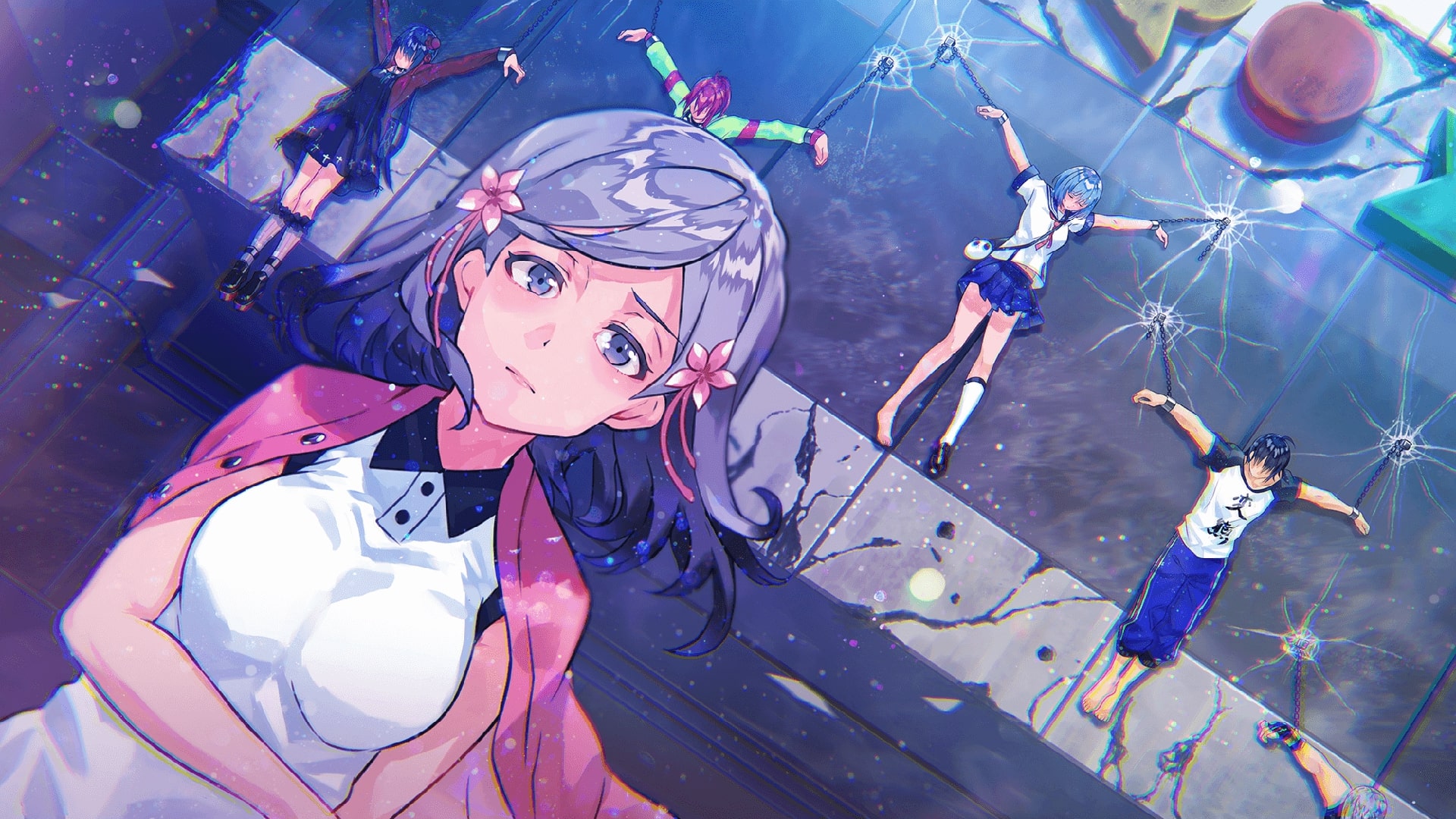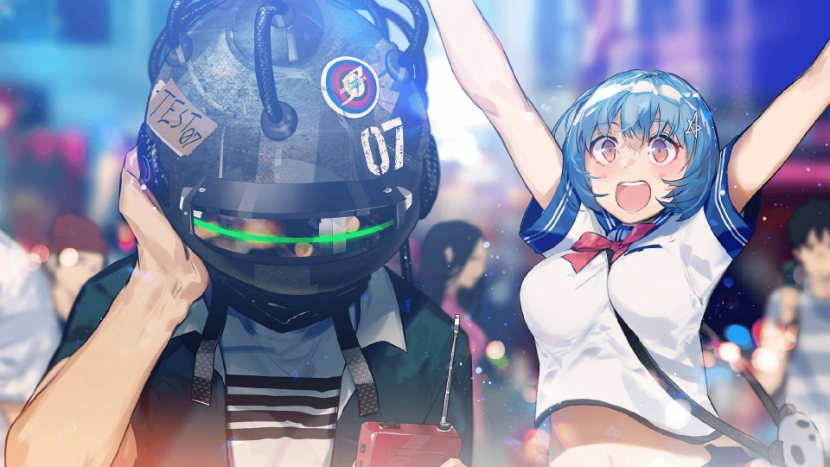Our World is Ended is a kitschy, sci-fi visual novel about a group of video game developers who accidentally warp reality through augmented reality technology. Under certain conditions, the team known as Judgment Seven blends the real world of Tokyo’s Asakusa district with the worlds of its video games, and existing in that space may or may not be a battle of survival. In the meantime, as protagonist Reiji and his co-workers figure out what the heck is going on, they spend a lot of time yelling about boobs.
VR + AR – HR
As I look back on it, I feel like Our World is Ended is what happens if you toss anime and something like It’s Always Sunny in Philadelphia into a blender. With this title, you get a lot of easy, breezy anime tropes, combined with a cast of characters that are comically horrible people. I say that, because that’s how the game presents them. Everyone in the core cast is an idiot, an aggressive pervert (Judgment Seven clearly doesn’t have an HR department), or both, and the writing and story are hyper aware of that. The appeal here is in how excessive each personality is and what happens when they clash. The constant boob jokes you’ll encounter wear thin quickly, but the characters yelling at each other while still somehow advancing the plot can be fun.
It would be nice, however, if the plot advancement didn’t happen at such a glacial pace. Our World is Ended often feels more interested in the mechanics and romantic aspects of the prototypical visual novel. Which characters the story ends up revolving around changes as the player makes various choices along the way. There’s more service done to this part of the game, especially within the first several chapters, than anything else. While the setup in the first few hours of Our World is Ended is briskly paced and introduces the world and characters well, the story ends up forgetting to, well, happen for several hours at a time. Everyone seems far more interested in wacky conversations.
Storytelling Woes

The effect of that is a lack of focus, which makes the actual hook of Our World is Ended very weak. The story constantly screeches to a halt before it can even really start developing. Visual novels can often be long and take forever to get from one major plot beat to another, but Our World is Ended struggles to establish what each plot beat even is and why they matter. Titles such as Fate/Stay Night, Steins;Gate, and Root Letter do a much better job at doing both, but focusing on characters deliberately meant to be exaggerated and unlikable doesn’t lend itself well to driving the drama.
What Our World is Ended often banks on is its personality. The art is striking, with lots of bright, pastel colors and bizarre little touches everywhere that make even the real world in the game seem stranger than our own. It can be genuinely funny when the scenario doesn’t involve characters screaming at each other over pervert gags for the 100th time. It’s also really dialed in to Japanese gaming culture, so if you have interest or experience in that realm, you might get a kick out of how Our World is Ended understands that space.
This plays into the “Selection of Soul” system. It sometimes turns those typical, story altering player choices into Nico Nico video comments, with words flying across the screen nearly as fast as you can read them. There are also normal, multiple choice options, which makes the Selection of Soul moments feel arbitrary. As far as a running gag goes, it works.
Our World is Present and Accounted For

Again, the ultimate issue with Our World is Ended is its lack of confidence in its own story. It sort of assumes the player is more interested in Judgement Seven’s antics over the sci-fi stuff, and as a result takes forever to actually do anything with it. Hours in real-world time will pass between story beats that develop the overall plot. Meanwhile, everything in-between feels pedestrian, like it’s obvious the player is jumping into a visual novel to eke out character routes as their main goal. The pause screen even displays the top three characters the player has garnered favor with, as if to suggest the “video game” parts of a visual novel are more important than the story, instead of both aspects being designed to feed each other.
In another timeline, there’s a version of Our World is Ended that’s a little punchier and that takes a little less time to introduce some stakes or conflict for Reiji and the rest of his Scooby gang. Those stakes drive the plot forward, and occasionally there are breaks to expand on the characters, their backgrounds, and the antics driven by big personalities attempting to forge relationships. Instead, Our World is Ended feels like an opportunity to tell an off-kilter sci-fi story like Danganronpa or Zero Escape a little differently, then falls flat by leaning too hard on tropes and superficial mechanics. Despite its brazen disregard for social appearances, Our World is Ended lacks drive and confidence needed to help a weird story come together in the end.
Our World is Ended review code provided by publisher. Version 1.00 reviewed on a Standard PS4. For more information on scoring please see our Review Policy here.
-
Visuals are stunning, full of color and life
-
Fun humor, especially the connections to real-life games pop culture
-
Judgment Seven's melting pot of idiosyncrasies can be fun
-
The "everyone is a pervert" gags grow stale and escalate in ways that aren't fun anymore
-
Plot is structured so haphazardly it feels like background noise at times
-
Lack of focus on plot leads to dubious motivations for both the characters and player at best




